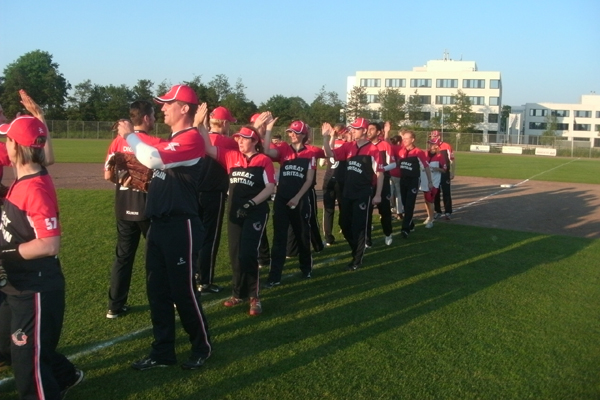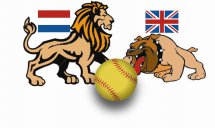They came, they saw and they conquered. The GB Slowpitch Team travelled to the Netherlands on the weekend of May 25-27 and proved more than equal to a Slowpitch Challenge posed by the Dutch. The GB Team won all four exhibition games played over three days at three locations against a handpicked Dutch team of high-level baseball and fastpitch players.
Two of the games were blowouts,  as the GB Team demonstrated that competitive slowpitch isn't quite as easy as it looks. The other two games were closer, but the GB Team still had plenty in reserve.
as the GB Team demonstrated that competitive slowpitch isn't quite as easy as it looks. The other two games were closer, but the GB Team still had plenty in reserve.
The weekend trip was organised and supported by European Softball Federation President Andre van Overbeek and long-time Dutch Federation member Anton Kops, along with legendary Dutch coach Andre Prins, in an attempt to raise interest in the slowpitch format in Holland. The British Softball Federation provided significant financial support for the tour.
The ultimate payoff from the trip will be a Dutch team competing in the next European Slowpitch Championships in 2013.
Newly-appointed GB Slowpitch Team Head Coach Steve Patterson and Team Manager Sara Vertigan took a strong GB team across the water, and after an opening game Friday evening, May 25, at the Olympia Softball Club in Haarlem, the remaining three games coincided with flagship fastpitch events: a day of Dutch top-division women's fastpitch games on Saturday, May 26 at the Gryphons Softball Club in Rosmalen, near Den Bosch, and then the Zeister Slot International Men's Fastpitch Tournament on Sunday, May 27 at the Phoenix Softball Club grounds in Zeist.
The GB Team consisted of:
Women:
Jenny Ball
Lucy Binding
Vicky Chapman
Emily Clifford
Nicola Duerden
Gelske Huyer
Kirsty Leach
Ruth Macintosh
Men:
Martin Digon
Brett Gibbens
Roger Grooms
Zak Haq
Ian Kulka
Robbie Robison
Dan Spinks
Ed Watkinson
The Games
GAME ONE:
Olympia Softball Club, Haarlem, 7.00 pm Friday
Game 1 of the Slowpitch Challenge was a one-sided affair, defined by a barrage of hits from Team GB while the Dutch team was getting to grips with the differences of the slowpitch game.
defined by a barrage of hits from Team GB while the Dutch team was getting to grips with the differences of the slowpitch game.
The GB players used their knowledge of the game to vary their hits in terms of location and power to take an early lead, posting eleven runs in the first inning. The Dutch got runners on base in each of the early innings, but couldn't manage to get a run across the plate. Team GB continued to show their flexibility and slowpitch expertise and ran up the score by the end of the game to 29-0.
Solid performances were marked by three hits each from Kirsty Leach, Emily Clifford and Vicky Chapman, and Vicky was only a double short of the cycle. Robbie Robison and Brett Gibbens collected four hits in the game, combining for 13 RBIs. All the GB players got into the game, including five Development Squad players earning their first “caps”.
In summary, Team GB hit very well and defensive misunderstandings by the Dutch allowed GB runners to advance and score at will. The question was, would the Dutch adapt?
GAME TWO:
Gryphons Softball Complex, Rosmalen, 1:15 pm Saturday
An entrance to remember was organised by Anton Kops on Saturday, with the Dutch and GB Teams entering the grounds at the Gryphons Softball Club on an authentic London bus, “The Red Lady”, preceded by a troop of Scottish bagpipers to march the teams onto the diamond.
The Dutch team was boosted by the arrival of new players, celebrities from the baseball/softball community in Holland, including former Major League Baseball players and Olympic fastpitch stars.
And it was clear from the outset that the Dutch had in fact learned from the previous night’s experience, while the new players had an instant impact on the game. Defensive re-positioning and “getting their eye in” on slowpitch pitches were evident.
The British side opened the game with three runs in the first inning on two walks and then a two-out home run by Hall of Fame power hitter Brett Gibbens.
GB added solo runs in the fourth and fifth innings to push the lead out to 5-0, but runs were far more difficult to come by than the night before. Outstanding defense from the Dutch left-fielder and third base player took hit after hit away from Team GB, which meant that the opportunity for a Dutch counterattack was always likely.
The Dutch were getting runners on base in each of the early innings with well-struck hits, but failed to string enough hits together to crack the scoreboard. That changed in the bottom of the sixth inning when a couple of GB errors plus a few Dutch hits narrowed the scoreline to 5-3.
But the GB Team regained its composure and both sides continued with strong defence as no further runs were scored.
The Dutch third base player was easily the standout player of the game, collecting three hits and scoring a run while shutting down the left side of the infield. Zak Haq and Gelske Huyer played well for the GB side.
GAME THREE:
Gryphons Sports Complex, Rosmalen, 3:00 pm Saturday
Game 3 was very much a continuation of Game 2, but in this one, it was the Dutch that got on the board early.
British bats struggled in this game, as an increasing wind posed a challenge to both teams.
Defence continued to shine in this game, but the Dutch took a 2-1 lead into the fifth inning. A series of singles by the GB side was enough to plate just one run in the bottom of the frame to tie the score.
A leadoff double by the Dutch did not get any further in the top of the sixth inning, and substitute Brett Gibbens proved his worth in the bottom of the sixth by clattering a two-run home run off the scoreboard to give GB a 4-2 lead to take into the final inning.
Another leadoff hit by the Dutch brought the tying run to the plate, but a fielder’s choice and a double play by infield combo Ian Kulka and Robbie Robison closed off a very tight ballgame.
Of significant note in this game was an exceptionalal running basket catch by GB left centre fielder Nicola Duerden. The use of experienced players late in the game proved to be the difference in a close contest, but several Development Squad players started the game, gaining valuable European experience.
After the games, the hosts continued to show their hospitality by offering complimentary “British Fish & Chips” for the players of both sides. In addition, an impromptu knock-about by a handful of GB players and coaches turned into a Home Run contest and defensive showcase with local youths.
GAME FOUR:
Phoenix Softball Club Grounds, Zeist 1:15 pm Sunday
This game was offered the key timeslot of the afternoon, as the precursor to a prestigious men's fastpitch game between the Dutch and the European Champion Danes in the annual Zeister Slot Tournament, with two British teams among the competitors. The stage was set for another showdown and the venue offered yet more exposure for the slowpitch game. Which GB team was going to show?
The answer came early. Lead-off singles by Dan Spinks and Kirsty Leach in the top of the first inning were followed by a three-run home run by Brett Gibbens.
The Dutch countered with a leadoff home run in the bottom of the first by a former MLB player. But then the GB offense took over and an inspired GB Team began to paint the lines and place balls where the defence wasn’t.
Team GB scored in every inning in this final game of the series, backed up by some fine defense from all positions. At the end of the fourth inning, the score was 10-1 in favour of GB and a number of positional changes and substitutions allowed the full GB Team to be used.
The depth of the squad was highlighted as the later innings provided a further nine GB runs. By the end of the game, a deserved win for the visitors came via a final score of 19-1.
Closing Ceremony
A brief closing ceremony was held following the final game, where ESF President Andre van Overbeek, co-organiser Anton Kops and the BSF's Mike Jennings all suggested that the weekend had been a potential turning point for Dutch softball. Both hosts referred to the event as “historic” and pledged that it would influence the development of slowpitch softball in the Netherlands.
Andre van Overbeek said: “Today is the first day of the next 100 years of Dutch softball.”
Mike Jennings recognised the efforts of the Dutch hosts in organising the event and digging into their own pockets to fund it, and he paid tribute to the GB players who invested both time and money to attend.
GB Head Coach Steve Patterson acknowledged the warm welcome that he and the GB Team received. “The warmth and reception that the GB Team have experienced over the last few days has made the trip very special,” Steve said. “On behalf of Team GB, I wish to thank you for pulling out all the stops.”
Success
Steve Patterson said: “The trip was a great success for Team GB, as we had the opportunity to play against new competition, gain valuable bonding time, offer opportunities for Development Squad players, and share goodwill for the expansion of the slowpitch game abroad.
“For the Dutch, it showed that they certainly could compete,” Steve added. “There is plenty of talent and facilities to support the growth of the game. The question remains, 'How much will the Dutch softball community embrace the slowpitch format'?”
Dutch reactions
From the Dutch point of view, the main goal of the event was to offer a demonstration of the slowpitch format to the people of Holland, since resistance from the Dutch Federation, according to Andre van Overbeek, had limited the exposure of slowpitch to date.
Anton Kops said that for him, it was a long-term goal to hold an official slowpitch event in Holland, and after seeing the game played well, the attitude of some players and clubs to slowpitch might change.
Both men were delighted with the results and felt that the weekend had exceeded their expectations. Andre van Overbeek suggested that attendance by the Dutch Federation President showed an open mind and he expected a “change of heart for the future of softball in Holland.”
Based on the reactions of both spectators and players, it was evident that all the games were enjoyed, with a realisation that slowpitch can involve far more movement and action than a pitcher’s duel in baseball or fastpitch softball.
Some fans felt slowpitch might be a better game to play than to watch, but they recognised that the GB players were serious about the game and its competitive possibilities.
As for the Dutch players, including former Major League Baseball players and Olympic fastpitch stars, they were impressed with the competitive nature of the game and felt that it offered an outlet for those who could no longer commit to the primary sports of baseball and fastpitch.
For Andre van Overbeek and Anton Kops, the key now is to develop a nationwide strategy to use slowpitch to attract new players to the sport. Anton also has a personal goal: to see his daughter and son-in-law, both distinguished players in their own right in fastpitch and baseball, play together on the same Dutch slowpitch team.
“Today, we made history,” Anton said, “and now we are far closer to realising that dream.”
